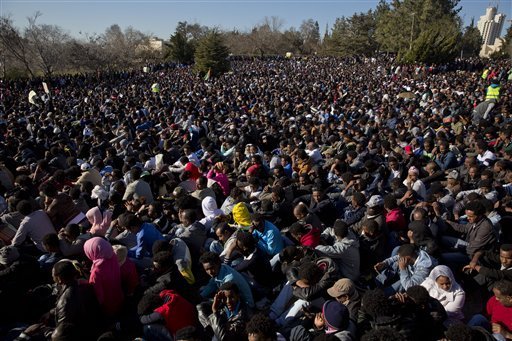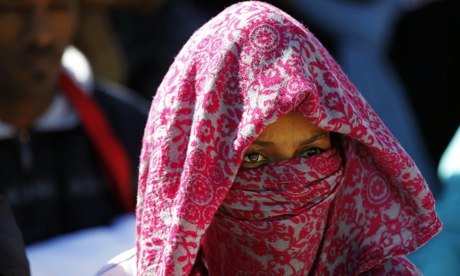Israeli parliament shuts its doors on protesting African refugees – Knesset bars access to delegation representing thousands of Eritrean and Sudanese ‘infiltrators’ on fourth day of action
An African migrant takes part in a protest opposite the Knesset. Photograph: Baz Ratner/Reuters Around 10,000 African refugees have taken their protest to the Israeli parliament in Jerusalem on the fourth consecutive day of demonstrations and strikes against


Around 10,000 African refugees have taken their protest to the Israeli parliament in Jerusalem on the fourth consecutive day of demonstrations and strikes against harsh detention laws, and to demand the authorities consider their asylum claims.
The speaker of the Knesset, Israel‘s parliament, refused to allow entry to a delegation to attend a meeting with politicians from leftwing parties. The protesters had been barred “against the backdrop of the tension and general public atmosphere, as well as the fear that granting the infiltrators access will cause provocations in the parliament”, the speaker’s office said.
Eli Yishai, the former interior minister, urged the government “to put every single one of the infiltrators in detention facilities, take their work permits, put them on aeroplanes and send them packing to their countries or a third country”.
Outside parliament, the acclaimed Israeli author David Grossman told protesters: “The idea of Israel contains the idea of refugees, of people who escaped from a terrible destiny to find refuge and shelter.”
He said he felt “embarrassed and ashamed that we have reached this situation. Israel has not created this problem but there is a problem now, and we have to struggle with it and to solve it in the most humane way. You are not criminals: you are normal, ordinary people who are trapped in an abnormal and very extreme situation.”
Tens of thousands of refugees, mostly from Eritrea and Sudan, have been on strike since Sunday, affecting hotels, restaurants and other services in which they are employed, usually without work permits in lowly paid, menial jobs.
About 20,000 took part in a demonstration in Tel Aviv on Sunday and up to 15,000 protested outside the US and European embassies and the offices of the UN refugee agency, the UNHCR, in the city on Monday. More than 100 detained refugees are on hunger strike.
The prime minister, Binyamin Netanyahu, has repeatedly said “infiltrators” from Africa threaten the Jewish character of Israel. “These are not refugees … they are illegal immigrants who have come looking for work,” he said at the weekend.
There are an estimated 53,600 refugees or migrants from Africa in Israel,nearly all of whom entered via Egypt, according to government figures. The flow has been almost completely halted by the construction of a steel fence along Israel’s border with Egypt last year.
According to interior ministry figures, none of 1,800 asylum requests from Eritreans and Sudanese have been approved; an estimated 70% of asylum applications from Eritreans and Sudanese are approved by European governments.
Last month, the Israeli government passed a law allowing for “infiltrators” to be compulsorily detained for up to a year. A new “open” centre in the desert has capacity to hold up to 9,000 migrants indefinitely. All are being encouraged to voluntarily return to their countries of origin.
“We have fled persecution, forced military conscription, dictatorship, civil wars and genocide. Instead of being treated as refugees by the government of Israel, we are treated as criminals,” an organisation called Freedom4Refugees said in a statement.
“A range of unprecedented policy changes has caused us to take drastic measures to display our discontent, frustration and fear … We have asked the Israeli government to improve [its] asylum policies, recognise us as refugees and give us our rights accordingly. Instead, with every year that passes, we have been criminalised, met with xenophobia and increasingly dehumanising policies.”
Critics of the government’s policy say Israel has sought to attract hundreds of thousands of foreign workers, mainly from south-east Asia, in recent years to take low-paid jobs such as care workers and agricultural labourers. Migrants and refugees from sub-Saharan Africa could be offered such jobs instead, they say.
Some also suggest Israel should be especially welcoming to refugees, given the history of persecution of the Jews. An editorial in the left-leaning Haaretz newspaper on Wednesday reminded Netanyahu of “the obligations required by Jewish moral values. Netanyahu, who speaks incessantly about the nation-state of the Jewish people, has forgotten what it means to be a Jew.”
• This article was amended on 9 January 2013. A subheading on the earlier version referred to “Somali” where it should have said “Sudanese”.

simerr2012 January 10, 2014
I would advise my African brothers and sisters to talk more to European and American Embassies, politicians so they can find a solution for resettlement believe me it is not worth to fight to stay or to be accepted in Israel as refugee. Do you want to live in a country where you are not welcome, in a country even a politician called you cancer, in a country a Prime Minister behaves and talks as street gang? In a country where ordinary people and leaders talk the same level? Running from a country is not a solution but once you are out , find a better place for your children.
Truly Truly i say to you January 10, 2014
Do not tell me Israel´s worry is baseless and injustice! Imagin this tiny nation is 5 times smaller than Eritrean territory ; and its population is almost double more than Eritrea. If alone from tiny nation of Eritrea more than 40,000 citizens seeking asylum, how could you do not understand their problems in regarding of national security, culture, social and others sensible isues fear that they could have? What about about if that coutry filled by foreigners about its citizens identity regardings? Please put Eritrean nation in position of Israel, and judge to yourself, let alone from Whole world alone if millions Ethiopians for different reasons if inter in our land , do you accept that? Or are you going to tell me, that matter is nothing to worry about? Myself not from rascist motive but i never accept that to happen and almost all Eritreans sharing with my view, despite we are so poor and backward. So why do you blaming Isrel as resist?
One of from the ten commandments of God says this.
“do not desire another man´s house, his wife, his slaves, his cattle, his donkeys or anything else that he owns.” (Exodus 20, 17)
In other word , anything that you do not like or wish to happen on you, do not wish to others.
So if Eritreans need to solve their problem they have to ask Israeles to support them to topple the dictator in Eritrea to the cause of all our problems . That is the right solution all sides that can satisfy.
abrham January 10, 2014
Brothers and sisters before you plan to make a demonstration have you remember what you registered at the time when you reach esrael?You see we Eritreans we are hiding the reality.Don’t blame esraely government b/ce if we say our problem is economically we are not asylum sickers but over 90percent of you registered that you were not having a problem in our country we came here to get beter job.Let me tell you ethiopia has clothed sending to 3rd country because of what we did after we reach the 3rd country.TOTALLY WE HAVE TO THINK ABOUT THE BROTHERS AND SISTER WHO WE LEFT THEM ON THE WAY TO GET OUR GOD’S ASSISTANS ON OUR WAY .Let us not forget how we reach to where we are now and not forget the ones who are strugling on our way
seley January 10, 2014
Deport them! they are economic refugees not political asylees!